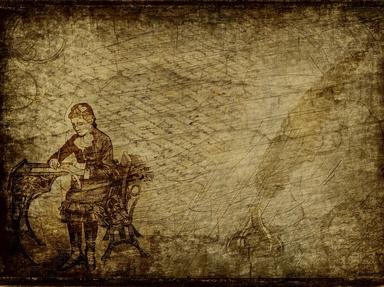Quiz Answer Key and Fun Facts
1. Robinson Jeffers was raised by a father who demanded academic excellence at an early age. William Hamilton Jeffers was a professional theologian, an editor of a scholarly journal, and a scholar of eight ancient languages who spoke three modern ones. He wanted his son to thoroughly understand his Judeo-Christian religious heritage and his Greco-Roman culture. As a result, by the age of twelve, Jeffers was in control of which languages?
2. Jeffers met Una Call Kuster in 1906 at the University of Southern California. They fell in love, but unfortunately Una was already married. The Kusters eventually divorced, and Robinson married Una on August 2, 1913. They ended up having one of the great marriages in literary history, but it took seven tumultuous years before they could marry. Which is the only one of the following events that was NOT one of the events of the years 1906 through 1913?
3. Robinson Jeffers' life and writing are both tightly connected to the Big Sur landscape. However, Una and Robin had planned to live in Lyme Regis, a small village on the southern coast of England. When their move was delayed they found Carmel almost by chance, and settled into what Jeffers called their "inevitable place." What had delayed their move to England long enough for them to find Carmel?
4. Living in Carmel affected Jeffers greatly. When he turned 31, he had what Una called "a kind of awakening such as adolescents and religious converts are said to experience." These lines from "The Tower Beyond Tragedy" captures some of the nature of this rebirth. Which line does NOT belong?
5. The philosophy that Jeffers developed as a result of his awakening he called "Inhumanism". He explained his thinking in a letter to a reader: "This whole [universe] is in all its parts so beautiful, and is felt by me to be so intensely in earnest, that I am compelled to love it, and to think of it as divine. . . . there is peace, freedom, I might say a kind of salvation, in turning one's affections outward toward this one God . . ."
Which of these lines explains the OPPOSITE of inhumanism--gives Jeffers' understanding of "sin" if you will?
6. In 1922 Jeffers again self-published a volume, "Tamar and Other Poems", which never sold. However, it later was widely reviewed, highly praised, and eventually republished by Boni & Liveright as "Roan Stallion, Tamar, and Other Poems". What event turned a box of books in Jeffers' attic into a national best seller?
7. Reviewers raved about the force of Tamar's story then; critics now see lines like these as evidence that Jeffers has tapped into the force of what powerful story retold in modern garb?
" . . . She in the starlight
And little noises of the rising tide
Naked and not ashamed bore a third part
With the ocean and the keen stars in the consistence
And dignity of the world. She was white stone,
Passion and despair and grief had stripped away
Whatever is rounded and approachable
In the body of woman, hers looked hard, long lines
Narrowing down from the shoulder-bones, no appeal,
A weapon and no sheath, fire without fuel . . ."
8. Jeffers had a quite successful career, but probably his greatest popular success was a verse play he translated upon the suggestion of Dame Judith Anderson. The success was partially because Anderson was at the height of her career when she starred in the play on Broadway, but it was also because Jeffers' adaptation of the play was brilliant. The "New York Times" called the production a landmark of the modern stage, and after a run of 214 performances it toured the nation and the world, including Denmark, Italy, and several other countries. Which play was it?
9. Jeffers wrote these lines to Una in 1952. Why?
"Whom should I write for dear, but for you? Two years have passed,
The wound is bleeding--new and will never heal.
I used to write for you, and give you the poem
When it was written, and wait uneasily your verdict . . ."
10. Jeffers died on January 20 1962. Which is the best statement of the state of his poetic reputation at that time?
Source: Author
NormanW5
This quiz was reviewed by FunTrivia editor
agony before going online.
Any errors found in FunTrivia content are routinely corrected through our feedback system.

